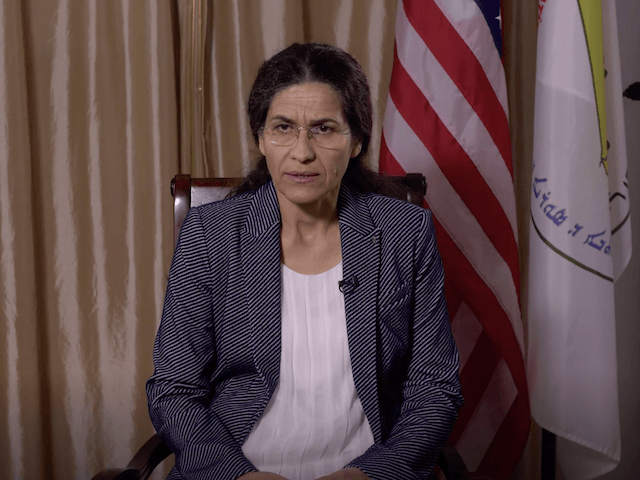WASHINGTON, DC — “Nobody” is willing to launch airstrikes to quell the growing threat posed by al-Qaeda-linked jihadis in Syria, who control more territory than any other terrorist organization there, a top Kurdish leader told Breitbart News.
While visiting the U.S. in recent days, Elham Ahmad, the co-president of the Syrian Democratic Council (SDC), spoke to Breitbart News through a translator about the terrorist threat still plaguing Syria. SDC is the political wing of the U.S.-backed Syrian Democratic Forces (SDF), a Kurdish-led local alliance fighting the Islamic State (ISIS/ISIL) in northern Syria.
“As for countering al-Qaeda [in Syria], I would say not much has been achieved in this regard. Al-Qaeda exists in Idlib [province]. They have expanded their territory recently,” she declared.
“Fighting al-Qaeda is limited to some clashes between al-Qaeda and the [dictator Bashar al-Assad] regime forces and militia groups that work with the regime, but I would say this is not enough. In order to defeat al-Qaeda, you need also local forces like how we defeated ISIS. We need aerial support, and there’s nobody in that part of the world who can take that step now,” Ahmad added.
News of al-Qaeda’s advancement in Syria came more than 17 years after the United States declared war on the group in response to the 9/11 attacks on the American homeland.
In recent years, U.S.-led coalition forces have primarily focused on defeating al-Qaeda rival ISIS in Iraq and Syria. Al-Qaeda captured more territory in recent weeks despite a deal between Russia and Turkey intended to push the jihadi group out. Russia recently blamed Turkey for al-Qaeda’s gains.
The SDF is a Kurdish-Arab alliance led by the U.S.-allied People’s Protection Units (YPG), the armed wing the Kurdish Syrian Democratic Union (PYD) that controls large swathes of northern Syria.
Hayat Tahrir al-Sham (HTS), an al-Qaeda-linked group in Syria, has established a stronghold in northern Syria’s Idlib province. The group is considered one of al-Qaeda’s most potent branches.
Although the U.S. State Department warned of “grave consequences” if HTS conquered Idlib, the al-Qaeda affiliate has nearly attained full control of the province.
Asked whether ISIS or al Qaeda posed the bigger threat at the moment, Ahmad responded, “We can say that al-Qaeda has bigger land that they are controlling, but the threat of ISIS is not only about the geographical area that they are controlling. Their sleeping cells are dispatched almost everywhere.”
While al-Qaeda has been expanding its territorial hold over Idlib province, ISIS’s so-called caliphate has been shrinking.
ISIS reportedly controls less than one percent of the territory it once held. Nevertheless, Ahmad said the threat of Islamic State threat “still exists,” adding that Syria is facing “two pillars of terrorism — al Qaeda and you have ISIS that’s still there.”
She stressed that U.S.-backed Kurds can “kill” all ISIS jihadis on the battlefield in a matter of “weeks,” but warned of the menace posed by lingering “sleeper cells” deployed by the group all over the country.
“In order to completely defeat ISIS, the support should remain because we need a lot of tactical intelligence support in order to finish the job of eradicating ISIS,” the Kurdish leader told Breitbart News.
U.S. President Donald Trump has announced plans to pull out all 2,000 American troops from Syria. However, the 5,000 troops in neighboring Iraq are expected to remain with the ability to go into Syria if necessary.
U.S. National Security Advisor John Bolton indicated a residual American force would remain in Syria to counter the Iran threat.
“Even a small American presence in our area, symbolically speaking, it means a lot and also technically speaking, they could be of great help for sharing intelligence and working together to defeat the sleeper cells of ISIS who are not threatening [only] us but the entire world as well,” Ahmad said.
She warned against a hasty withdrawal.
“As for the American withdrawal, we respect the choices of the American people,” she said. “The announcement of the withdrawal would be bad for us, however, if the withdrawal would go fast, uncoordinated, and not studied well and if the American forces do not consult with the partner forces on the ground: us.”
“If the withdrawal is sudden, this will create a lot of problems. The area would be subjected to more threat from external powers,” the Kurdish leader added. Besides the United States, pro-Syrian opposition Turkey and dictator Basah al-Assad’s allies Iran and Russia also maintain a presence in Syria.
She went on to say the Kurds are looking for “guarantees and assurances that our area is not going to be attacked by anybody” and that they “will not be slaughtered.”
America’s NATO ally Turkey has threatened to attack YPG-held areas in Syria. Turkey has long considered the U.S.-backed Syrian Kurdish fighters an affiliate of the Kurdistan Worker’s Party (PKK) terrorist group that has been waging an insurgency on Turkish soil for decades.
Ahmad denied that the YPG-led Syrian Democratic Forces are affiliated with the PKK and accused Turkey of “Kurdish-phobia.”
Turkey and Russia are on opposite sides of the war but reached an agreement last year to free Idlib of al-Qaeda and their heavy weapons, to no avail. The Russia-Turkey pact is part of mutual efforts to end the conflict in Syria, raging since March 2011.
Last week, the U.S. intelligence community warned against the ongoing al-Qaeda threat in its annual World Threat Assessment.
“Al-Qa‘ida elements in Syria … continue to undermine efforts to resolve that conflict,” the report warned.

COMMENTS
Please let us know if you're having issues with commenting.